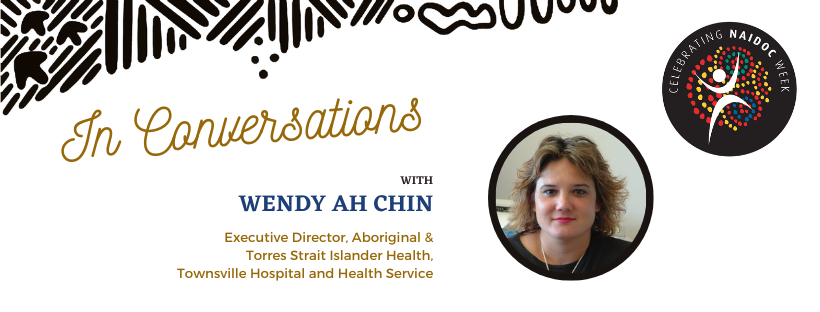In conversations with Wendy Ah Chin
29 Jul 2022

Wendy Ah Chin Executive Director, Aboriginal & Torres Strait Islander Health, Townsville Hospital and Health Service
Wendy Ah Chin is a proud Waanyi woman on her father’s side. The Waanyi peoples territories are from the south of the Gulf of Carpentaria, near Normanton in Queensland and into the Northern Territory. Wendy was born in Collinsville and spent her early years in Mount Isa. Wendy returned to North Queensland in August 2021 as the Executive Director Aboriginal and Torres Strait Islander Health for the Townsville Hopsital and Heath Service.
Wendy Ah Chin previously held senior executive roles with both Northern Territory and Commonwealth government departments. We spoke to Wendy about leadership and her main passions; addressing social inequality, improving Aboriginal people’s health and wellbeing and building the Aboriginal workforce’s capacity. Here is what she told us.
As you know, this year’s NAIDOC theme is Get Up! Stand Up! Show Up! encourages communities to unite and champion institutional, structural, collaborative and cooperative change while celebrating those who have driven positive change for Aboriginal and Torres Strait Islander communities over generations.
What does mean for you personally?
It means being part of the change you want to see. To not be a passive bystander. To take accountability to drive the change and reform as much as you can. It doesn’t matter if you are the CEO or the cleaner, we all have to invest energy and effort and all have to be accountable.
Relationships are critical and investing in them is the key. Health cannot fix its challenges alone and we must invest time, resources and commitment to partner with our consumers and stakeholders both internally and externally. Addressing issues such as homelessness, overcrowding, education, and creating economic development opportunities are critical influencing factors that we need to address if we are going to improve our health and wellbeing outcomes.
We cannot step away from this – My goal is to not take small steps but big strides in terms of rolling our reforms to improve Aboriginal & Torres Strait Islander health outcomes.
We must look to leverage all capacity and create shared goals and craft a narrative to incite positive and sustainable action and outcomes.
How do you try to bring that to life as a leader in First Nations Leader in your organisation?
This is my first identified Aboriginal and Torres Strait Islander senior executive position. I understand that it is important for this role to be both inspirational and aspirational – you cant be what you cant see. More importantly though you have to walk the talk. I therefore try to emulate our ICARE values in everything I do. That doesn’t mean I’m perfect or wont have bad days but street cred in leaders is important. Staff see through leaders that say one thing but do another.
I also believe setting expectations and creating a consistent and trusted relationship with staff in the organisation must be built up. Leading through ethics is not something you can rush but something you must be consistently working on, by being clear in expectations and not looking the other way when they are not met. Calling it out, respectfully, delivering what you say you will – this will build credibility and trust.
What can organisations do to support First Nation Leaders and executives within their organisations?
Create Pathways. Particularly in regional areas these are hard to find and often hard to see, particularly as a young person. We need to work with schools to assist in pathwaying the opportunities, not just into identified roles, but into broader health services and occupations. Make it easier for Aboriginal & Torres Strait Islander people to see where they can go and how they can progress and navigate within the workplace.
Succession Planning. More investment needs to be placed in building and developing local talent and planning for their next step. Assist in creating the opportunities and working with people to grow and develop within the organisation, so that the next step is not too big for people.
Data-Driven Decisions. Organisations need to look at what the data is telling them when making investments and interventions. This will ensure we focus on the right things that the outcomes and return on investment is making the change we all want to see.

